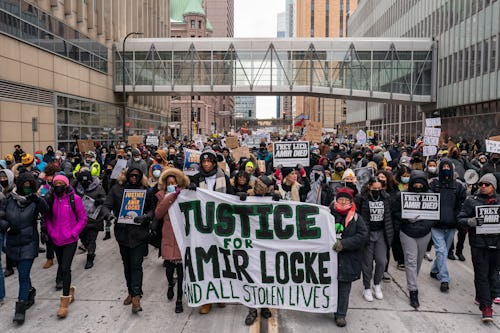
For the second time in two years, Minneapolis, Minnesota, is once again the flashpoint of the frustratingly slow fight for criminal, racial, and social justice in the face of oppressive police violence. While the eventual conviction of former officer Derek Chauvin for the 2020 murder of George Floyd brought a measure of closure to a grieving community, the still-raw wounds of Floyd’s death and the mass uprising that followed have been ripped open again, after Minneapolis Police SWAT officers shot and killed Amir Locke during a no-knock raid last week. That Locke was not named in the warrant, and was simply crashing on someone else’s sofa, made the circumstances of his death all the more anguishing for a city still reeling from the injustices Floyd’s death rendered impossible to ignore.
To give a sense of how interconnected the cyclical struggle for justice in Minneapolis has become, consider that on the same day high school students left their classes and marched to the governor’s mansion in St. Paul to protest Locke’s death, a federal judge settled a years-long lawsuit against the state, ordering more than $800,000 in reparation payments to journalists who were targeted, attacked, and injured by state patrol officers during the Floyd protests. Furthermore, the state patrol is now legally barred from interfering with, dismissing, or damaging the equipment of journalists. And if you think that having to codify “don’t beat up the press” is the sort of thing that suggests perhaps law enforcement is more prone to fascistic tendencies than some people would like to admit, keep in mind that journalists from Reuters, CNN, Vice, and other high-profile outlets were all attacked — and in some cases seriously injured — by officials during the uprisings.
And yet, the fact that law enforcement acted with such gleeful abandon during the Floyd protests is rendered even more chilling with a new report linking not one, but two of the Minneapolis SWAT officers who conducted the no-knock raid that killed Locke with one of the most egregious examples of police violence during the 2020 protests: “hunting” Black Lives Matters activists and other demonstrators, including Vice journalist Michael Anthony Adams, through the city’s streets and firing rubber bullets at them from an unmarked van. Kristopher Dauble and Nathan Sundberg, the two SWAT officers involved in both incidents, are currently being sued by Jaleel Stallings, who was beaten by the squad after he returned fire with his licensed handgun, thinking he’d been attacked by white supremacists. Stallings was eventually acquitted of all charges stemming from his arrest that night. (Neither Dauble nor Sundberg fired the fatal shots that killed Locke.)
“I’m concerned that these officers, involved prior use-of-force issues, are still operating in high-risk operations,” Stallings’s attorney told Rolling Stone this week. Speaking with the Minnesota Reformer, the attorney noted that he was unaware of any official departmental consequences for the officers who attacked his client. If there was any sort of disciplinary action taken against them, it apparently wasn’t the sort of thing that would have precluded them from participating in the fatal shooting of Locke this month.
It’s unclear what, if any, actions will be taken against any of the officers responsible for Locke’s death. Minnesota Attorney General Keith Ellison has already pledged to investigate the incident. But until someone addresses the broader issue of how pervasive this sense of permissive violence within Minneapolis Police Department and other law enforcement agencies in the state is — particularly when it’s directed toward the community they’re ostensibly charged with protecting — then it’s likely that this cycle will only keep repeating itself, with the same players, and the same tragic results, over and over again.


.png?w=600)




